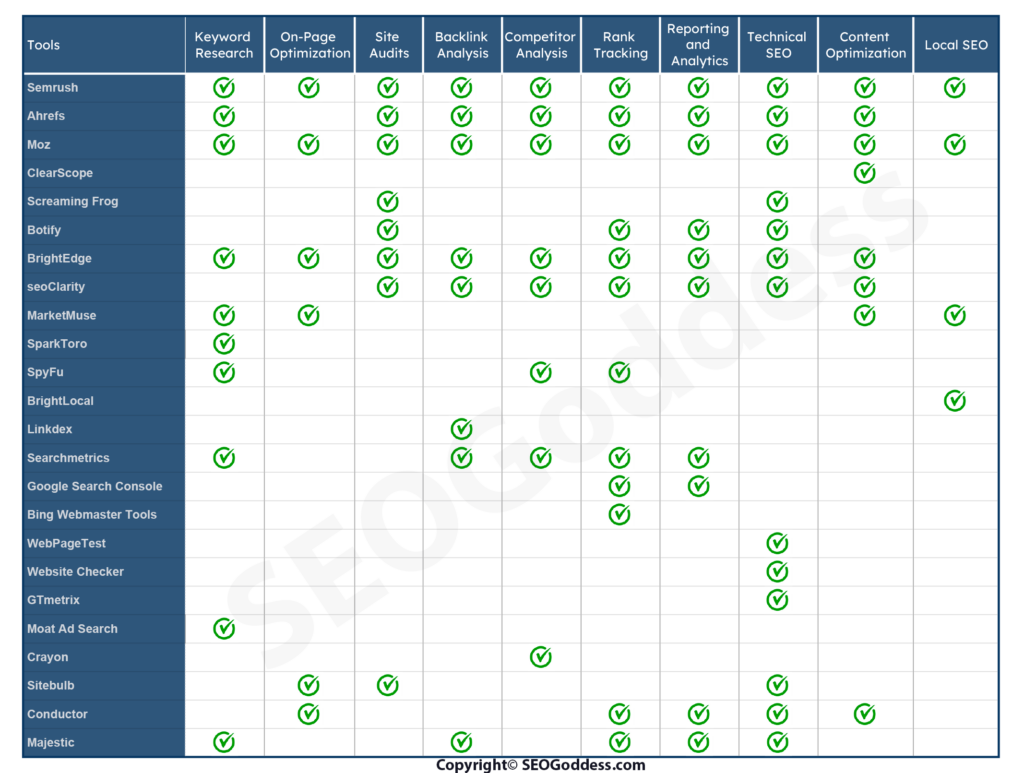This article explores popular SEO tools, discussing their strengths and weaknesses. From Semrush’s versatile content optimization to Ahrefs’ keyword research expertise, we’ll cover tools like ClearScope, ScreamingFrog, Botify, Brightedge, seoClarity, Moz, Majestic, Conductor, MarketMuse, SparkToro, SpyFu, BrightLocal, Linkdex, Searchmetrics, Google Search Console, Bing Webmaster Tools, WebPageTest, WebSite Checker, GTmetrix, Moat Ad Search, Crayon, and Sitebulb. By understanding the pros and cons of each tool, you can make informed decisions to optimize your SEO efforts.
Below are the pros and cons of each SEO tool:
Semrush:
- Pros: Versatile tool for optimizing content, provides search intent data, aligns search volume results with Google’s data, offers comprehensive site audit report and on-page SEO checker.
- Cons: Limited in selecting multiple crawl sources for site audits.
Ahrefs:
- Pros: Specializes in keyword research, provides keyword difficulty scores, offers accurate rank tracking, and supports link-building strategies.
- Cons: Limited to analyzing up to 10 competitor sites, Legacy account couldn’t be retained.
ClearScope:
- Pros: Comprehensive tool for content optimization, provides an extensive list of related terms, offers content grading, and supports content creation in multiple languages.
- Cons: Lacks integration with Grammarly, content inventory feature limited to monitoring up to 50 pages and tracking up to 3 keywords per page.
ScreamingFrog:
- Pros: Valuable for technical audits, offers word count analysis, identifies broken links and technical SEO problems, and provides insights for website improvements.
- Cons: Primarily focused on technical SEO, not specifically tailored for analytics and reporting.
Botify:
- Pros: Robust crawling capabilities, fast website crawling speed, customizable reports, integration with various tools, support content optimization, and improvement.
- Cons: Pricing and specific cons not mentioned.
Brightedge:
- Pros: Provides detailed content recommendations, offers extensive historical data capabilities, unlimited data viewing, and exporting, and supports keyword translation.
- Cons: Lacks keyword intent information, limitations on tracked keywords, and unavailable pricing details.
seoClarity:
- Pros: Offers optimization recommendations based on top-ranking pages, supports collaboration for content optimization, comprehensive support for international SEO, and unrestricted language support.
- Cons: Historical reports may require a fee, specific cons not mentioned.
Moz:
- Pros: Strong focus on local SEO, comprehensive site audits, keyword research tools, and a large SEO community.
- Cons: Interface can be overwhelming for new users, limited backlink analysis, and occasional inaccuracies in search volume data.
Majestic:
- Pros: Extensive backlink database, detailed link analysis, and various SEO metrics for in-depth analysis.
- Cons: Limited keyword research capabilities, less emphasis on on-page optimization, and a steeper learning curve.
Conductor:
- Pros: Advanced content optimization and strategy features, extensive keyword research, and competitive analysis capabilities.
- Cons: Higher pricing, complex user interface, and limited reporting options.
MarketMuse:
- Pro: Advanced content analysis and optimization features help improve content quality and search rankings.
- Con: Can be expensive for some organizations, making it less accessible for smaller budgets.
SparkToro:
- Pro: Provides valuable insights into target audience demographics and behavior, aiding content and marketing strategies.
- Con: The tool’s functionality may be limited beyond audience research, potentially lacking other SEO features.
SpyFu:
- Pro: Offers competitive analysis and keyword research features to uncover competitor strategies and profitable keywords.
- Con: The user interface may not be as intuitive as other tools, potentially requiring a learning curve for new users.
BrightLocal:
- Pro: Specializes in local SEO, providing features specific to local businesses like local search ranking tracking and citation management.
- Con: Some businesses may have a relatively high pricing plan, making it less accessible for smaller budgets.
Linkdex:
- Pro: Helps with link prospecting, outreach, and relationship management, supporting link building strategies.
- Con: Can be time-consuming to find and analyze relevant link prospects.
Searchmetrics:
- Pro: Offers comprehensive SEO insights and analytics, including keyword research, competitor analysis, and content optimization recommendations.
- Con: The pricing may be higher than other SEO tools, making it less accessible for smaller budgets.
Google Search Console:
- Pro: Provides valuable data on website performance, indexing, and search visibility on Google.
- Con: Limited to Google search data and does not cover other search engines.
Bing Webmaster Tools:
- Pro: Offers insights and data specific to Bing search engine, providing additional optimization opportunities for Bing search results.
- Con: May not be as widely used as Google Search Console, potentially resulting in less comprehensive data.
WebPageTest:
- Pro: Helps analyze website speed and performance, providing actionable recommendations for improvement.
- Con: The interface may be less user-friendly for beginners, requiring some technical knowledge.
WebSite Checker:
- Pro: Provides a quick website health analysis, identifying common SEO issues and suggesting improvements.
- Con: The tool’s functionality may be limited compared to more robust SEO tools.
GTmetrix:
- Pro: Offers detailed website performance analysis, including page speed metrics and optimization suggestions.
- Con: Some advanced features may be limited to the paid version, restricting access to full functionality.
Moat Ad Search:
- Pro: Allows for ad creative research and competitive analysis in the advertising space.
- Con: Focuses primarily on ad research and may not provide extensive SEO-specific features.
Crayon:
- Pro: Provides competitive intelligence, monitoring competitor websites and changes in design, content, and messaging.
- Con: The tool primarily focuses on design and messaging rather than comprehensive SEO analysis.
Sitebulb:
- Pro: Offers in-depth website auditing and reporting, identifying technical SEO issues and optimization opportunities.
- Con: Some businesses may have a relatively high pricing plan, making it less accessible for smaller budgets.
Please note that the above pros and cons are based on the information found on their website and some personal experience. Before deciding, it’s always recommended to thoroughly evaluate each tool based on your specific needs and requirements.
Checklist Comparing Each SEO Tool’s Feature

Use this graphic on your own website by simply copying and pasting the code below:
<img src="https://masteroptimization.com/wp-content/uploads/2023/05/SEO-Tools_compared-1024x773.png" alt="Comparing SEO Tools Features"><br><p style="font-size: 10px;" align="center">Courtesy <a href="https://masteroptimization.com/the-basics/the-pros-and-cons-of-seo-tools-103">MasterSEO.io</a><br>Copyright© <a href="https://seogoddess.com">SEOGoddess.com</a></p>
Jenn Mathews, known as the SEOGoddess, is an esteemed expert in Enterprise SEO with over 20 years of experience. She has held key positions at organizations like GitHub, Groupon, and Nordstrom, where she has showcased her expertise in technical SEO, strategic development, and championing SEO within large enterprises. Jenn now shares her knowledge through mentoring, writing for Search Engine Journal (SEJ), Search Engine Land (SEL) and speaking engagements.





